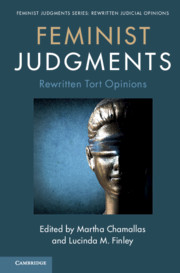Book contents
- feminist judgments: rewritten tort opinions
- Feminist Judgments Series Editors
- Feminist Judgments: Rewritten Tort Opinions
- Copyright page
- Contents
- Notes on Contributors
- Preface
- Table of Cases
- Part I Introduction
- Part II The Classics
- Part III Intentional Torts
- 6 Commentary on Robinson v. Cutchin
- 7 Commentary on Guthrie v. Conroy
- 8 Commentary on Lyman v. Huber
- 9 Commentary on Sipple v. Chronicle Publishing Co.
- Part IV Negligence and Vicarious Liability
- Part V Damages
- Index
8 - Commentary on Lyman v. Huber
from Part III - Intentional Torts
Published online by Cambridge University Press: 28 November 2020
- feminist judgments: rewritten tort opinions
- Feminist Judgments Series Editors
- Feminist Judgments: Rewritten Tort Opinions
- Copyright page
- Contents
- Notes on Contributors
- Preface
- Table of Cases
- Part I Introduction
- Part II The Classics
- Part III Intentional Torts
- 6 Commentary on Robinson v. Cutchin
- 7 Commentary on Guthrie v. Conroy
- 8 Commentary on Lyman v. Huber
- 9 Commentary on Sipple v. Chronicle Publishing Co.
- Part IV Negligence and Vicarious Liability
- Part V Damages
- Index
Summary
In Lyman v. Huber, a woman who had endured decades of emotional abuse from her domestic partner was awarded damages for intentional infliction of emotional distress (IIED) by the trial court, but the appellate court reversed, concluding that while she actually did suffer severe distress, a reasonable person would not have suffered. The rewritten feminist opinion upholds the trial verdict, pointing out that the legal requirement that an IIED victim’s suffering should be measured against an objective “reasonable person” standard is contrary to normal tort principles that compensate for the harm actually incurred. It argues that IIED law should be changed to permit recovery for harm actually caused, rather than “reasonably” experienced, and demonstrates implicit gender bias in the “reasonable person” standard. The accompanying commentary discusses how courts, as exemplified by this case, have erected heightened IIED standards for domestic abuse victims that have made it far more difficult for them to recover damages.
Keywords
- Type
- Chapter
- Information
- Feminist Judgments: Rewritten Tort Opinions , pp. 172 - 193Publisher: Cambridge University PressPrint publication year: 2020



